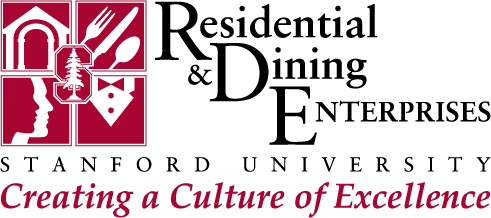Commitment to Catering to the Muslim Student Body
Halal Meat Availability
In all dining halls, R&DE Stanford Dining provides halal meat upon request.
Accessibility
Dining halls are open to undergraduates, graduate students and staff. One can purchase a meal plan or pay with Cardinal Dollars. Cardinal Dollars can also be used at all R&DE Stanford Hospitality & Auxiliaries retail cafes such as The Axe and Palm. The Axe and Palm offers halal options and is a convenient option when the dining halls are closed.
FAQ
What does the term halal mean exactly? Is there a difference between Arabic and non-Arabic speaking countries?
Halal is an Arabic term meaning legal from the perspective of Islam, and applies more broadly to Islamic code of conduct external of dietary restrictions as well, such as moral conduct in behavior- essentially the opposite of sinful within Islam. In context of diet, halal mainly means a diet containing no pork, no alcohol, and no pork-based gelatin (sometimes used as a thickening agent in yogurts and candies such as marshmallows). It also refers to the humane method by which an animal is slaughtered and prepared for human consumption.
In Pakistan and Bangladesh, the term Zabiha is more commonly used to refer to the way an animal is slaughtered for its meat. In contrast to the term halal, this term is reserved for referring to manners of Islamically- adequate meat consumption like the restriction of pork, and the method of humanely slaughtering an animal, but does not refer to moral conduct outside of food consumption. However, there is no difference in the essential technical dietary implications of the two different terms.
What makes food halal? What is allowed and what is forbidden?
Both terms are used to embody the Islamic necessities that when an animal is butchered for consumption, the animal does not endure prolonged suffering, the animal is not slaughtered in front of another animal so as not to cause emotional distress or fear in any animals and that the animal is blessed in the name of Allah before it is slaughtered. The blade of the butcher’s knife must be very sharp in order to minimize pain and the animal must be slaughtered and cannot be killed through shock or bludgeoning. All seafood is considered halal to most Muslims, except those that have been known to consume human flesh such as sharks.
Is it difficult to eat halal food at Stanford? What are the options that are available to Muslim students?
No, it isn’t difficult at all to eat halal foods at Stanford. Halal meats are regularly featured at dining halls daily, are clearly labeled as halal, and are of very high quality. They also come from local farms and markets. At the Axe and Palm, lamb and beef burgers, and chicken breast are all available in halal- students need only special request them, for no additional charge, and allow a few more time for their burgers to cook, since they are sometimes defrosted and cooked on demand. It’s a microscopic sacrifice to make for such a luxurious service for Muslim students.
How are religious holidays observed? What are the challenges of a Stanford Muslim student and what are the available options during periods such as Ramadan?
R&DE Stanford Dining is incredibly sensitive to accommodating Muslim students’ dietary needs and in helping us celebrate Muslim holidays and festivities as a united community. Ramadan is the holy month when Muslims observe the anniversary of the month within the Islamic lunar calendar, Ramadan, when the holy Quran was revealed to the prophet Muhammad (peace be upon him) and fast (no food or water) from sunrise to sunset, each day, for 30 days. The month shifts each year so it is not aligned with the Gregorian calendar. Muslims celebrate the day following the end of Ramadan during Eid-ul-fitr, when Muslims gather for a special Eid prayer and local festivities hosted by mosques like fairs and carnival rides for kids- and of course- FOOD!
[see more Ramadan information below]
Ramadan
Ramadan marks the anniversary of the month within the Islamic lunar calendar when the holy Quran was revealed to the prophet Muhammad. Muslims observe the month by fasting, abstaining from food and water from sunrise to sunset daily.
R&DE Stanford Dining supports fasting Muslim students' observation of the traditional pre-dawn meal: waking up just before dawn to eat a nutrient-rich breakfast (known in Arabic as suhoor) to keep us fueled throughout the day via the Boxed Pre-Dawn Meal program! Students enjoy a selection of nutritious foods including specialty cheeses and whole wheat rolls- and even traditional Islamic delicacies like dates and pistachios- picked up the previous night from a dining hall. Having this awesome R&DE Stanford Dining kit helps students make good use of their pre-dawn time. Instead of fumbling around in the dark hitting snooze until sunrise, dreading the thought of groggily scrambling an egg, students can conveniently focus on nutritionally preparing for the discipline of fasting and reading Quran.
At sunset, Maghrib, Muslims break their fast with iftar. R&DE Stanford Dining extends hours of operation at Arrillaga Family Dining Commons and Ricker Dining to close an hour after sunset, to best accommodate students breaking fast. R&DE Stanford Dining also features traditional Middle-Eastern inspired entrees with halal meats during Ramadan. It's this type of attention to detail, flexibility and deep cultural respect for students from all backgrounds that makes R&DE Stanford Dining an incredible luxury to enjoy. This sort of programming helps Muslim students feel more than just accepted and acknowledged, but celebrated and honored. Sometimes it's tough taking classes while away from family during Ramadan, especially during long summer days, so it's doubly meaningful for R&DE Stanford Dining to foster a sense of family for students at our home-away-from-home during the holidays.
